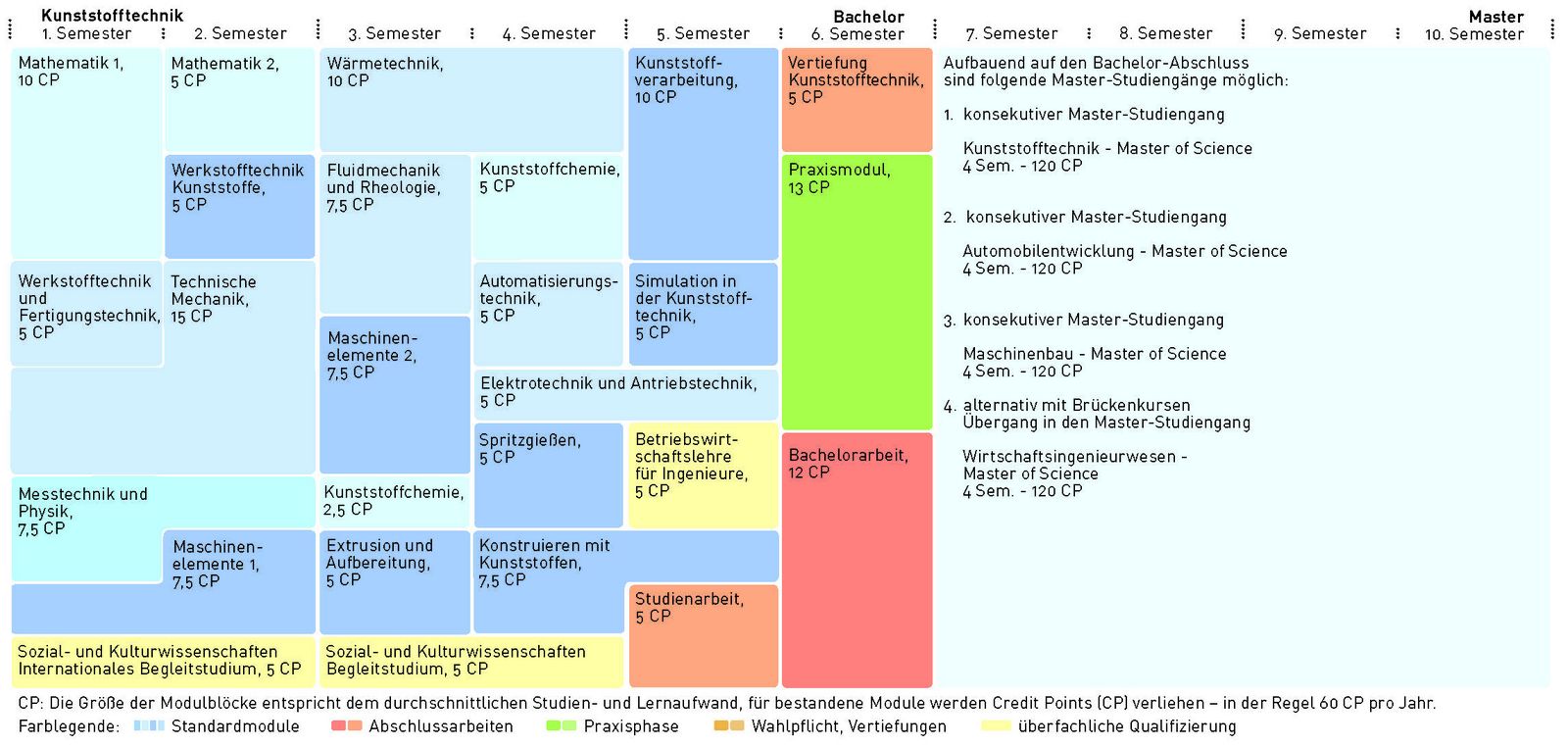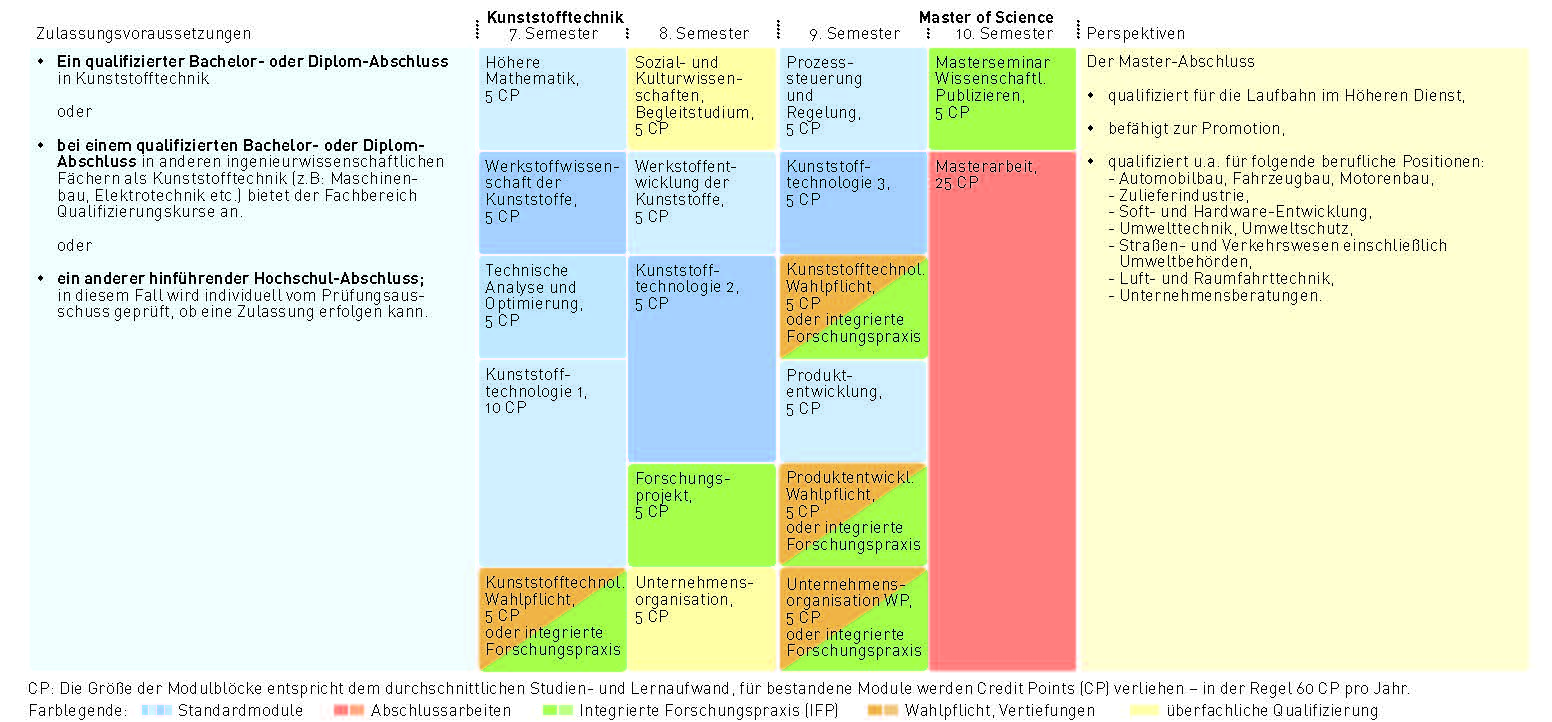
Plastics technology
Bachelor of Plastics Technology
Plastics are an integral part of our everyday lives: they can be found in smartphones, bicycles, skateboards, shoes, bags and much more. How are plastics different, what about sustainability, recycling and the circular economy? How is the world of plastics changing and how are products developed and manufactured from them? And what machines are needed for this?
Do you want to know how the world of plastics works? Then the Bachelor's degree course in Plastics Engineering is just right for you! In six semesters, you will acquire comprehensive basic knowledge in this fascinating field. But that's not all: we also teach you language skills and team qualifications that will prepare you for a successful career. And the best thing about it? Our course is based on mechanical and process engineering, so it stands out from other courses with a chemical focus. And if you need a little extra support, we offer the right pre-courses.
Aims of the study program
Do you want to develop into a person who masters mechanical and process engineering? Would you like to get to the bottom of polymer materials and drive technologies forward? Then the Bachelor's degree course in Plastics Engineering is just right for you! Here you will not only be trained professionally, but your social skills will also be strengthened. Because only those who master both will be successful. Join us and shape the future of plastics technology!
Modules. How is the course structured?
All students receive a "Diploma Supplement" in which their grade is assigned an ECTS grade from A to E, as is the case in Anglo-Saxon countries, for example. This promotes mobility and underlines the international orientation of Darmstadt University of Applied Sciences.
The modules of the Bachelor's degree program in Plastics Engineering provide qualifications and skills for these fields of activity (see Figure 1). These modules can include lectures, project work or laboratory phases.
Which qualifications are important?
They must be capable of interdisciplinary, system-oriented thinking and acting on the basis of sound engineering fundamentals and solid basic knowledge in the fields of toolmaking and plastics processing. They must be able to easily model complex technical relationships and master strategies for solving complex problems. You must be able to develop findings using scientific methods and apply them as a qualified specialist in the plastics industry. But that's not all! You must be able to design modern plastics technology processes and implement them with suitable tools and be able to design and realize or adapt products and systems taking into account the specific material properties, especially of plastics.
So, what are you waiting for? Immerse yourself in the world of plastics and become a true expert in this fascinating field!
Master's degree in plastics technology - a career on a new level
Ready to take your career to the next level? Then the Master's degree course in Plastics Engineering is just right for you! Here you will not only learn everything you need for challenging tasks in research and development, but also how to implement your own ideas in a scientifically sound way. With integrated research projects and a Master's thesis, we will take you to a new level - and all with a scientific approach that will inspire you.
But that's not all! On our Master's degree course, you will not only learn specialist skills, but also how to be successful as a manager in the technical and scientific field. Our professors will teach you management skills that will prepare you for any challenge. So what are you waiting for? Take the power option of the Master's degree program in Plastics Engineering and take your career to a new level!
Qualification goals
What skills do you need to take on a leading role in the world of plastics technology? The Plastics Engineering Master's degree course answers this question with a whole range of skills that we teach our students. It's not just about solid engineering fundamentals, but also about the ability to think scientifically and critically with interdisciplinary references. After all, anyone who wants to be successful in the plastics industry must also be able to understand and model complex technical relationships. The course will also provide students with the ability to apply engineering knowledge as qualified managers in the plastics industry, to transfer theoretical contexts to related fields and to design and implement modern plastics technology processes. This also includes the design of products and systems, taking into account the specific properties of materials, especially plastics. The ability to design and implement or adapt extensive systems for processing plastics and to organize and manage processes in development and production.
Those who have mastered all these skills are not only in demand as qualified managers in the plastics industry, but also in other areas that require a system-oriented way of thinking and acting.
Our Master's program is offered in cooperation with the renowned Fraunhofer Institute for Structural Durability. In this way, we guarantee a practice-oriented education with a balanced theoretical component that will prepare you optimally for the challenges of professional life. Thanks to the generous support of industry, our study conditions are simply unbeatable. You will benefit from state-of-the-art technology and well-equipped laboratories. And best of all, our course is open not only to bachelor's graduates in plastics engineering but also to graduates in related engineering subjects such as mechanical engineering, technical chemistry or precision engineering.
Our Master's program gives you access to the higher civil service and qualifies you for a doctorate with us or at German or foreign universities. Enrol now and let's take your career to the next level together!
Modules. How is the course structured?
All students receive a "Diploma Supplement" in which their grade is assigned an ECTS grade from A to E, as is the case in Anglo-Saxon countries, for example. This promotes mobility and underlines the international orientation of Darmstadt University of Applied Sciences.
Our degree program consists of three exciting theoretical semesters with many internships and a one-semester thesis, which are divided into exciting modules. We work closely with our cooperation partners to offer you a wide range of courses, project work and laboratories in various specialist disciplines. With us, you will not only study theory, but also work closely on current practical issues in exciting research projects with our professors. You will learn to work independently and use scientific working methods effectively to master the trickiest challenges.

